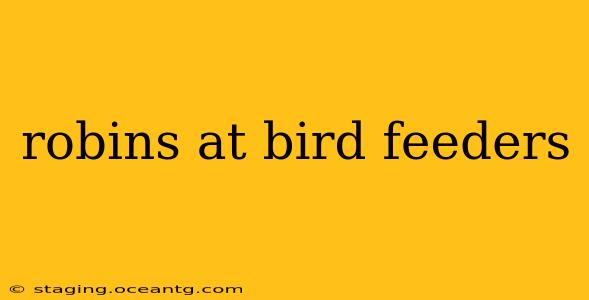Robins, those cheerful red-breasted birds, are a common sight in many backyards. While they're not typically considered "feeder birds" like chickadees or cardinals, you might find them visiting your bird feeder, especially during certain times of the year. This guide delves into why robins visit feeders, what they eat, and how to attract them (or deter them, if necessary).
Why Do Robins Visit Bird Feeders?
This is a common question among bird enthusiasts. Robins are primarily insectivores, meaning their diet consists mainly of insects, worms, and other invertebrates. However, during the breeding season and winter months, their food sources can become scarce. This leads them to supplement their diet with other readily available food sources, which may include what's offered at your bird feeder.
What Do Robins Eat at Bird Feeders?
While robins don't typically go for seeds, they might be tempted by certain offerings:
- Suet: The high-fat content of suet provides a valuable energy boost, especially during colder months. However, they're more likely to sample it if other food sources are lacking.
- Mealworms: Live mealworms are a protein-rich treat that robins will readily consume. Offering these can be a highly effective way to attract them.
- Fruit: Sliced apples, oranges, or berries can attract robins, as they are naturally omnivorous and enjoy fruits as a part of their diet.
How to Attract Robins to Your Bird Feeder (or Not)
If you want to encourage robins to visit your yard, consider these strategies:
- Offer a variety of food: A diverse selection will attract a wider range of birds, including robins.
- Provide a water source: Birds need water for drinking and bathing, making a birdbath an essential addition to your backyard habitat.
- Plant native berries: Shrubs and trees that produce berries will provide a natural food source for robins. Serviceberries, dogwoods, and viburnums are excellent choices.
- Create a safe haven: Provide shelter from predators with dense shrubs or trees.
Conversely, if you'd prefer to discourage robins from your feeders (perhaps they are outcompeting other birds), try these methods:
- Remove fruit and suet: These are the most appealing offerings for robins.
- Offer food preferred by other birds: Focus on seeds and nuts that robins are less likely to consume.
- Use feeders designed to deter larger birds: Some feeders are designed to prevent larger birds like robins from accessing the food.
Are Robins Harmful to Other Birds at Feeders?
Robins are generally not aggressive towards other birds, but their larger size might allow them to dominate feeders, especially if food is scarce. This competition for resources can be a concern for smaller birds. However, providing ample food and a variety of feeder types can mitigate this issue.
Do Robins Eat Seeds?
While not their primary food source, robins can eat seeds, particularly crushed seeds or those mixed with other ingredients like suet. They are much more likely to consume insects, fruits, and berries.
What Time of Year Are Robins Most Likely to Visit Feeders?
Robins are most likely to visit feeders during the late fall and winter months when natural food sources are less abundant. Breeding season (spring and summer) is when they primarily focus on insects and worms.
What's the best type of bird feeder to attract robins?
There isn't one specific "best" feeder type for robins. However, platform feeders or open tray feeders are best suited for robins, as they don't require the dexterity needed for hanging feeders. Providing multiple types of feeders ensures a variety of birds, including robins, have a chance to feed comfortably.
By understanding robins' dietary habits and preferences, you can better manage your bird feeders to attract a diverse range of avian visitors to your backyard. Remember, creating a healthy and welcoming habitat benefits all birds and enhances the enjoyment of birdwatching.
